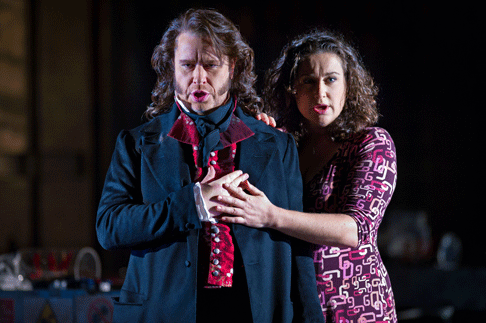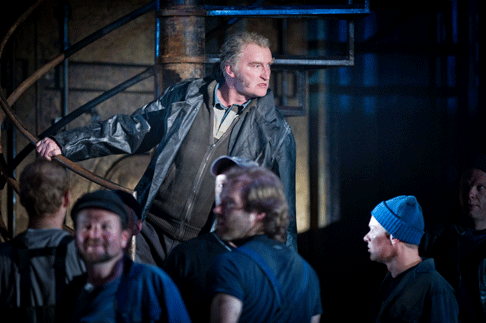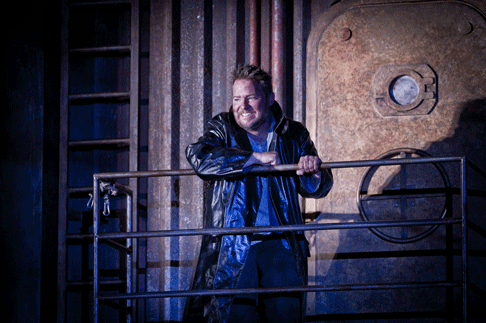There is much to enjoy musically,
though there are a few problems too, but Jonathan Kent’s production fails
to cohere. Whilst resemblances to Tim Albery’s dreary production across
town for the Royal Opera are doubtless coincidental — though might it not
reasonably be part of a stage director’s job to inform himself of what
others in his position have done? — the factory setting of the second
act, the increasingly odd, yet unrevealingly odd, costumes, and apparent
unwillingness or inability to listen to Wagner’s score present an
unfortunate kinship.
Unlike Albery, Kent appears to have some ideas. The problem is more that
they rarely seem properly thought through, and that they do not necessarily
cohere with each other. Video now seems more or less obligatory for the
Overture; it is very well done here, but is it really necessary to evoke storms
visually when Wagner does pretty well for himself with the orchestra. The
curtain comes up a little way in, to present a little girl, a young Senta, one
presumes, reading a book, referring to the Flying Dutchman, one presumes,
whilst apparently being pushed aside by her busy father. (Weird lighting made
the girl appear, at least from my seat, as if she were auditioning for The
Black and White Minstrel Show. I wondered what on earth was going to
happen, feeling quite filled with foreboding, until I realised that she had not
after all blacked up.) The timing is unclear; sometimes we appear to be vaguely
contemporary, at other points a few years back, though certainly not when
Wagner sets his drama. It seems that Senta therefore imagines her Dutchman from
her childhood fantasies; the problem here is that in no way is this as
coherently presented as when Harry Kupfer in Bayreuth and Berlin unforgettably
presented the drama as her dream. Is she dreaming the rest of the drama? It
does not appear so. In which case, how is it that anyone else can see the
Dutchman? Most do not — a ghost, perhaps? — but Daland certainly
does. How, otherwise, can he treat with this strangely nineteenth-century
apparition. A more Romantic, dangerous figure might make more sense; this
Dutchman, however, dresses more like a character from Jane Austen. He stands
out, but not necessarily in the right way; the concept either does not work or
is not adhered to consistently.
A potentially good idea is the viciousness of the other factory workers
towards Senta. She clearly does not fit in; they mock her, make her miserable.
She belongs somewhere else: Wagner would surely have agreed. This continues
into the third act, but alas, an apparent wish to be ‘theatrical’
undermines what might truly have intrigued and provoked. Albery too had a
tawdry vision of the crew’s celebrations. Having married — or
imagined marrying — the Dutchman during the entr’acte, Senta now
finds herself jeered at, molested, and seemingly worse (shades perhaps of David
McVicar’s ‘Dance of the Seven Veils’, in which
Salome’s childhood abuse is relived). The women of the community do not
care; they aid and abet the events. Unfortunately, the presentation is so over
the top that it becomes more ludicrous than threatening, more West End musical
or perhaps television game show than serious music drama. (And The Flying
Dutchman is nothing if it is not taken seriously.) Amongst the oddities we
witness are a person dressed up as a parrot, lots of inflatable toys, some
people with Santa Claus hats, at least one woman with a huge red hand, and a
few supernumeraries whose principal function seems to be to look good when they
take off their shirts. It all seems quite out of proportion to whatever we have
seen before, and reeks of a desire for spectacle, of whatever sort. Not once
did I have the impression that Kent was responding in any depth to the score;
often he did not even respond to the words. The frankly silly dance movements
flatly contradicted, yet not in an interesting way, Wagner’s writing.
 James Creswell as The Dutchman and Orla Boylan as Senta
James Creswell as The Dutchman and Orla Boylan as Senta
Senta is then rescued by the re-appearance of the Dutchman’s crew
— unfortunately rendered in amplified, recorded form: a terrible mistake
— but how and why, if, and I repeat if, they do not really exist? Has she
merely imagined everything? In that case, it is difficult to take seriously any
claims to societal critique, at least without further guidance or refinement.
As for why a spotlight suddenly swung around the theatre and focused upon a
seemingly random part of the Coliseum ceiling, I simply have not the faintest
idea. My abiding impression of Kent’s production, then, was of an
undergraduate with a few too many ideas, who would need to be taken aside,
advised to deepen his acquaintance with the work over a few years, before
returning to it and deciding more clearly how to pursue one or two of those
ideas. The contrast with ENO’s most recent other Wagner, Nikolaus
Lehnhoff’s ‘heap of broken images’ Parsifal, is
stark.
The ENO Orchestra was on magnificent form, as fine as I can recall hearing
it. As for Edward Gardner’s direction, this was a reading clearly
determined to focus on dramatic excitement. There is nothing wrong with that,
up to a point, but it missed Wagner’s depths. There was little of the
problems with maintaining dramatic line that bedevil so many conductors —
an impressive achievement for someone conducting his first Wagner opera —
but the sound and drive seemed more appropriate to Verdi, or at a push perhaps
to Rienzi. As so often, the Overture suffered from being driven too
fast to start with and then abruptly altering to a drawn out snail’s
pace. Yet once that was over with, and to the extent that one could ignore the
lack of ‘German’ depth in sound quality as well as
‘musico-dramatic’ striving towards symphonism, there was a good
deal to enjoy. Whether one should be ‘enjoying’ rather than
thinking is of course another matter, but it was a relief to be spared the
stopping and starting one so often endures, even in high-ranking houses.
Perhaps Gardner’s conception will deepen over time. The work was
performed without an interval, without the later, ‘redemptive’
halos to the conclusions of the Overture and the third act. I heartily approve,
though a highly distinguished Wagner scholar, to whom, as it happens, I had
been speaking on the telephone just before heading off to the Coliseum, thought
otherwise. (Apparently he had advised Gardner to opt for the more
‘authentic’ version with intervals, on the basis that Wagner never
performed it otherwise.)
 Clive Bayley as Daland
Clive Bayley as Daland
James Creswell made for the most part a commanding Dutchman; his care with
the words, here sung in David Pountney’s translation, was noteworthy.
Unfortunately, Orla Boylan seemed quite miscast as Senta. It is, I know, a very
difficult role, but her often squally tone often turned downright hectoring; at
times, it was almost impossible not to wince. Intonation deteriorated as the
work progressed too. Thank goodness, then, for a typically detailed character
portrayal from Clive Bayley, despite the silly dance he was forced to perform
at the end of the second act, and for the undoubted star of proceedings, Stuart
Skelton as Erik. His Romantic ardour led one to sympathise as often one does
not, yet he ensured that one remained aware of the character’s
limitations, of his modest existence, so as to avoid the danger of thinking
Senta should have thrown in her lot with him after all. Skelton’s is a
fine voice, of course, but he can act too — and certainly did. Though the
voices could hardly be more different, I was reminded of a
production I saw in Vienna, in which Klaus Florian Vogt — the first
time I heard him — quite stole the show. Despite that misguided decision
concerning the Dutchman’s crew, the choral singing was, a few rough edges
aside, of very high quality: weighty and yet surprisingly incisive. Would that
I could say the same concerning the production. For far more interesting
stagings, turn on DVD either to Kupfer from Bayreuth or to
Martin Kušej’s recent production for the Netherlands Opera.
Mark Berry
 Robert Murray as Daland’s Steerman
Robert Murray as Daland’s Steerman
![James Creswell as The Dutchman [Photo by Robert Workman courtesy of English National Opera]](http://www.operatoday.com/Dutchman_ENO_2012-01.gif)


